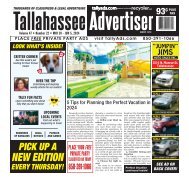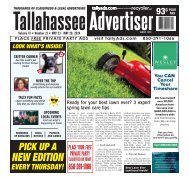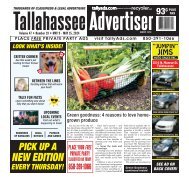TLA42_AllPages
Create successful ePaper yourself
Turn your PDF publications into a flip-book with our unique Google optimized e-Paper software.
ASLEEP<br />
at the wheel<br />
FMCSA can lead truck drivers<br />
to CPAP therapy, but it can’t make them sleep<br />
By Kris Rutherford<br />
Rusty Traxler insisted he never felt sleepy when operating a vehicle.<br />
“I never knew I had a big problem other than I’d stop [breathing]<br />
for slight moments, and I snore — at least according to my wife,” said<br />
Pennsylvania-based truck driver Traxler.<br />
After a sleep study confirmed he had obstructive sleep apnea<br />
(OSA), Traxler became a statistic. He was one of the 28% of truck drivers<br />
diagnosed with OSA. His career soon became complicated.<br />
“The issue has had me angry since they hit me with it,” said Traxler<br />
of his experience with Federal Motor Carrier Safety Administration’s<br />
sleep apnea guidelines. “I’ve been fighting to keep my CDL ever since.”<br />
According to the National Sleep Foundation (NSF), OSA is “a disorder<br />
in which breathing is repeatedly interrupted during sleep.” Conditions<br />
and symptoms of people with untreated OSA include anxiety,<br />
high blood pressure, and depression, all of which are known to<br />
increase the severity of OSA. The impact of a severe case of untreated<br />
OSA on a driver is the equivalent of operating a vehicle at twice<br />
the blood alcohol level considered legal in most states. Still, OSA is<br />
treatable. In most cases, those with the condition use a continuous<br />
positive airway pressure (CPAP) device to ensure productive sleep.<br />
Following his sleep study, with CPAP in hand, Traxler visited<br />
his physician, and he expected to receive clearance to drive. He<br />
was wrong.<br />
Traxler visited two physicians to obtain CPAP certification. The first<br />
told him to provide evidence of CPAP compliance for 30 days. The<br />
second asked for 60 days. Traxler eventually gained clearance, but<br />
that was not the end of his ordeal. When he needed recertification, a<br />
physician told him he needed a 90-day compliance record.<br />
Traxler says the FMCSA guidelines related to OSA are subjective,<br />
and different physicians can read the data and come to different<br />
conclusions. He believes the guidelines force physicians to take a<br />
cautious route for fear of being held liable in the event of an OSArelated<br />
incident.<br />
“I‘ve never slept more than five or six hours, with or without a<br />
CPAP,” shared Traxler. “I didn’t need a $700 study to tell me that.”<br />
AN INDUSTRY VETERAN’S VIEW<br />
Cliff Abbott is a trucking industry veteran who has worked as a truck<br />
driver, recruiting manager, and director of driver developments; he<br />
has studied industry trends as a trucking-media veteran. Abbott has<br />
had his fair share of experience with what he calls “arbitrary” DOT guidance<br />
on OSA. He too believes the FMCSA guidance places too much of<br />
a burden on physicians’ analysis of subjective data.<br />
“The problem stems from the requirement that the physician not<br />
only recognizes sleep apnea but is satisfied with its treatment and<br />
control,” said Abbott. “Unfortunately, FMCSA guidance does not<br />
define what ‘treated and controlled’ means.” Examiners often look<br />
to physical characteristics such as neck size, body weight, and age<br />
when estimating whether a driver has potential for OSA.<br />
“While these may be indicators, they don’t prove anything,” said<br />
Abbott, noting that plenty of drivers have all the indicators, but they<br />
sleep fine without mechanical help. “There’s an overabundance of<br />
caution,” he said.<br />
FMCSA, DRIVERS, PHYSICIANS RECEIVE CRITICISM<br />
“Examiners often ask for the latest printout from the driver’s CPAP<br />
machine,” said Abbott. “Other times, they’ll request a report from the<br />
driver’s primary physician based on the CPAP data.” FMCSA does not<br />
stipulate a timeline for when a report should be deemed invalid.<br />
Abbott has seen enough CPAP printouts to understand how 10<br />
different doctors might interpret identical data in 10 different ways.<br />
Opinions of abnormalities based on the number of incidents of waking,<br />
gasping, and mask leakage differ among physicians, he said.<br />
“Too many drivers are delayed or even denied medical certifications<br />
based on a subjective process,” continued Abbott. Ultimately, drivers<br />
are often required to pay for testing while unemployed and uninsured.<br />
Abbott has concerns about FMCSA’s OSA guidelines, but he<br />
says drivers share the blame. While all drivers are not cut from<br />
the same cloth, “the driver population is notorious for noncompliance,”<br />
he said. Lack of compliance requires physicians to be cautious,<br />
he said. Compliant drivers are then unfairly subjected to<br />
increased scrutiny.<br />
FMCSA Spokesman Duane DeBruyne explained the federal-state<br />
partnership in ensuring all drivers are medically sound to operate<br />
a truck safely. “A CDL is a state-issued license,” he said. “The state is<br />
certifying that the individual possesses the knowledge and skills to<br />
operate a large commercial motor vehicle on public roadways.”<br />
14 TRUCKLOAD AUTHORITY | www.Truckload.org TCA 2020

















